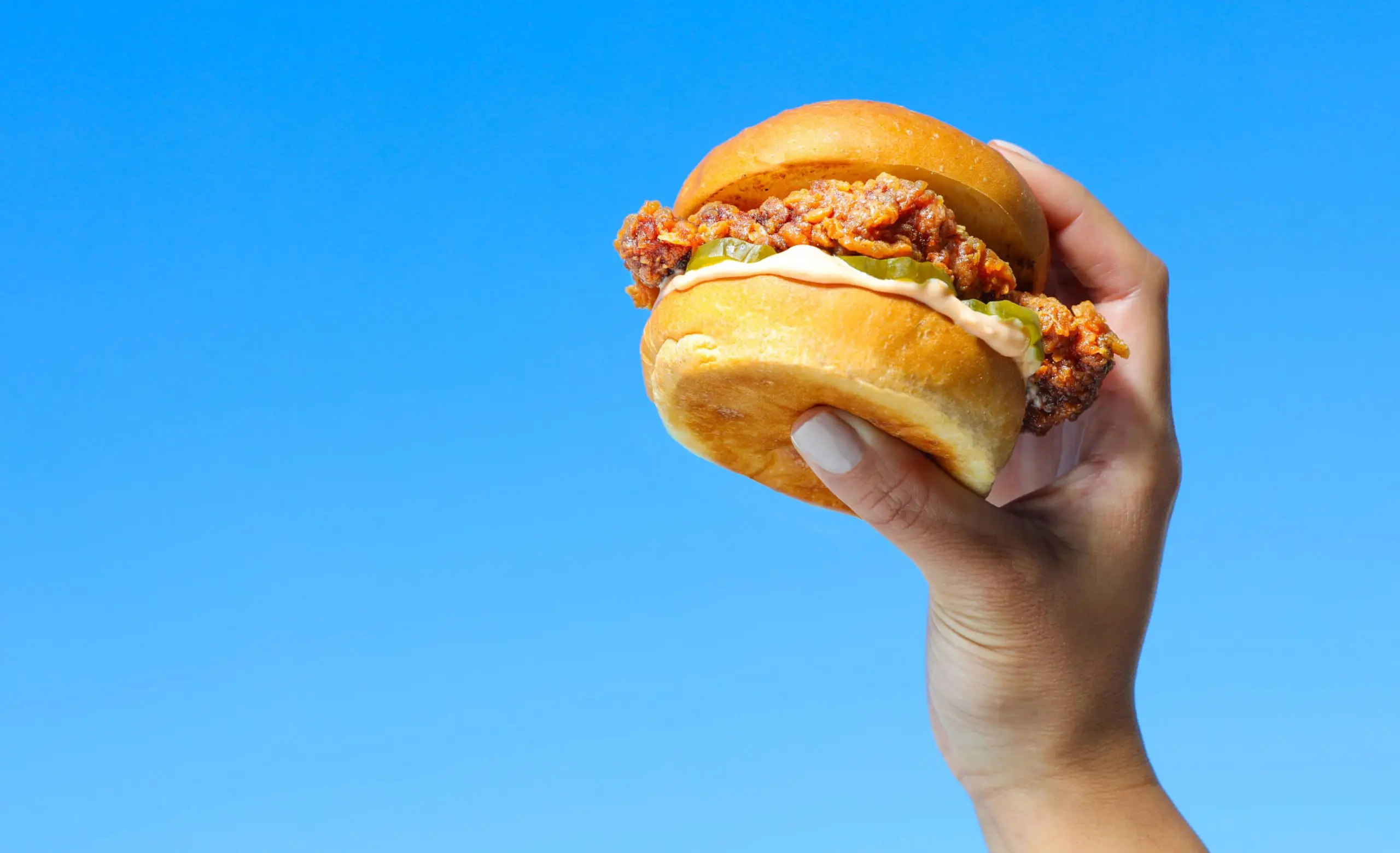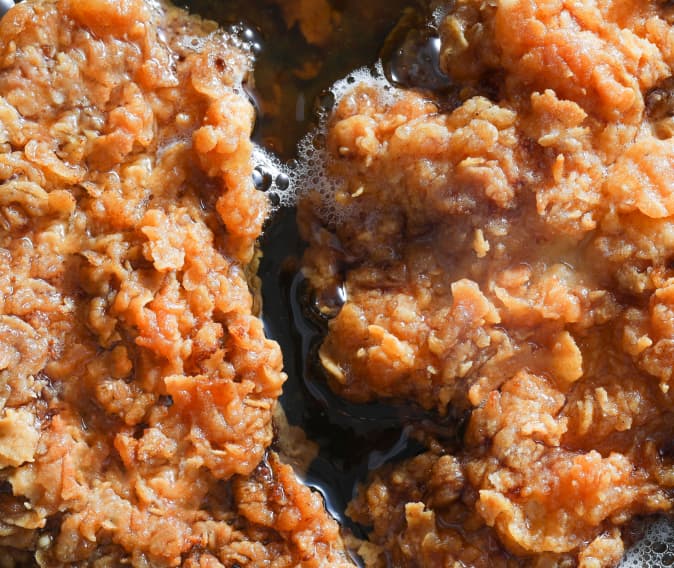Why We Do The Hard Things First
September 13, 2023

“But why, some say, the moon? Why choose this as our goal?”
– President John F. Kennedy
When President Kennedy delivered his historic remarks at Rice University in 1962, jump-starting the space age and transforming humanity’s sense of what was possible, he notably didn’t choose for us to explore low orbit, which may have been a “reasonable” next step. He chose to go to the moon.
I’m reminded of this because I’m sometimes asked why UPSIDE Foods—the world’s leader in cultivated meat—first focused on the whole-cut chicken filet rather than a less technically challenging blended product. At first glance, cultivated meat may not have much in common with putting a man on the moon but in fact, both goals share something essential about what it takes to change the world: it often pays to do the hardest things first.
The Hard Things Teach Us The Most
Not only did Kennedy’s ambitious goal focus the “best of our energies and skills” on a single vision, but the pursuit of that vision led to the invention of all sorts of technologies that we now take for granted, among them vacuum-sealed food, advanced cameras, and thermal blankets. It was an object lesson in innovation: focusing on a big problem accelerates innovation in multiple directions.
That’s certainly been true for UPSIDE Foods. As the world’s pioneer in cultivated meat—delicious meat grown directly from animal cells—UPSIDE Foods faces all sorts of challenging puzzles. They deal with culture and traditions, science and innovation, safety and nutrition, and scale and economics. By choosing to solve a very complex puzzle first—a delicious, whole-cut chicken filet, in our case—we activated the highest levels of our imagination and problem-solving and therefore learned more things more quickly. For instance, in the course of producing whole-cuts, we uncovered invaluable insights into manufacturing several other delicious and simpler to scale, which we will be introducing in the future.
Does starting with the hard things mean you encounter more hurdles and more setbacks early on? Of course. But by setting a high bar early on, we paved the way for other, less complex products to come online. As we turn our attention to scaling mass-market products over our next two and a half years, we do so stronger and smarter.
The Hard Things Inspire Us
When Kennedy asked us to do the hard thing first—to land humans on the moon—he galvanized a nascent NASA program, whose work became a calling and wellspring of inspiration. But he did more than that. Scores of astronauts, scientists, and engineers of all stripes credit the moon landing for their decision to pursue these fields. And they didn’t all end up working in space. They transformed all sorts of domains, like computing, communications, and medicine. This fact offers another, even more profound lesson: taking big swings inspires and galvanizes us.
At UPSIDE Foods, we know that the whole-cut filet won’t be our first mass-market product. But we also know that you won’t have a mass market for cultivated meat in the first place unless you build a movement of people excited by what you’re making. And so our goal has always been to lead with a product that is both exciting and substantive, like our whole-cut filet, which is now available monthly to consumers at San Francisco’s Bar Crenn.
If you’re going to create real mindshare and tip a culture towards something genuinely new, you need to give people a taste of what’s possible. Producing a whole-cut chicken filet first was all about proving that it can be done, that cultivated meat can be every bit as tasty, tender, juicy, and appetizing as conventionally produced meat. Our success with the whole-cut chicken shows the range of possibilities for other delicious meats like lamb, pork, and beef. It was important for us to make this clear early on because we need consumers and the big, entrenched players—food giants, governments, institutional investors, and so forth—to see the full promise of this new category. We need them on our team if the status quo is really going to change.
And it is changing. For a long time, people believed cultivated meat was too hard, too costly, that consumers wouldn’t get it. But where are we now? Well, the needle is moving fast. Since UPSIDE Foods launched in 2015, we inspired an entire cultivated meat industry to form up around us. We now number more than 100 companies strong! It wasn’t because we set our sights on chicken nuggets, by the way.
Why We Do the Hard Things First
Just as UPSIDE Foods welcomes a good challenge, we also welcome constructive feedback. In fact, we’re harder on ourselves than our detractors are because we know that the journey ahead will be at least as challenging as what’s behind us. But we’re not interested in conflating difficulties or setbacks with failure. Our mission to make food a force for good is far too important and too urgent to risk throwing the baby out with the bathwater.
Did President Kennedy’s moonshot encounter setbacks along the way? Did it confront its share of skepticism? You bet. But these are footnotes in history. The headlines are taken from what the moonshot inspired despite the setbacks and the skepticism. After all, what’s so memorable about Kennedy’s extraordinary call to action is that it concluded with a successful moon landing. The program didn’t only achieve its aim and much more. By aiming high, it accelerated our progress in multiple domains. And that outcome is no anomaly. There’s a rich history of extraordinary ambition guiding successful and transformative innovation, ranging from the development of the polio vaccine to the completion of the Human Genome Project and beyond.
In my life, whether as a young immigrant, a cardiologist, or a researcher pioneering new technologies, I’ve confronted the hard things early and often. It’s been worth it every time because you summon the best in yourself when you confront the hard things. You find out that you’re capable of a lot more than you had realized. And guess what? It turns out that innovation shares a lot in common with this aspect of life. The decision to be bold is actually grounded in pragmatism. Sometimes the ideas that seem unreasonable are the very ideas that reveal to us our full potential. And only then are we freed to achieve them. Ultimately, this is why UPSIDE Foods chooses to do the hard things first. If not us, then who? If not now, when?



